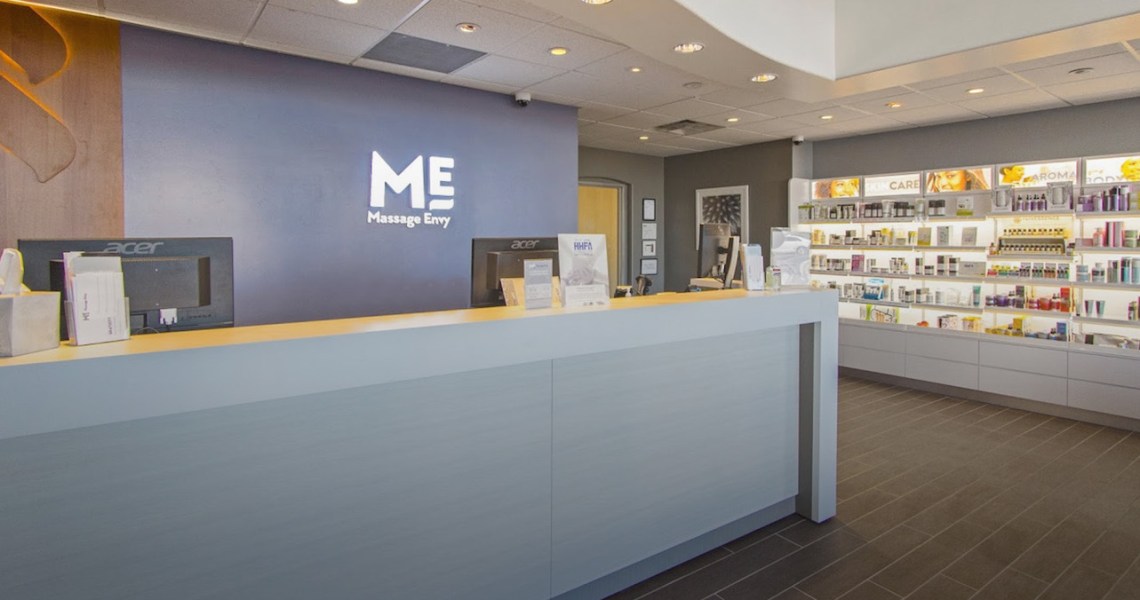Massage and skin-care chain Massage Envy is introducing a new campaign to grow its facial business.
The 18-year-old company introduced facials to its massage-only service menu in 2018. For 2020, Massage Envy is increasing its budget for advertising facials from 20% to 50% of its total marketing spend, according to Kathy Collins, Massage Envy chief brand and innovation officer. By the end of 2020, facials will represent 20% of the services performed at its 1,100 locations.
The campaign, called “Start With a Facial,” features comedians Vanessa Bayer and Arturo Castro. It’s set to run throughout the year across linear and connected TV, which will make up 70% of the campaign, as well as on Facebook, Instagram and TikTok. In Bayer’s commercial, she speaks directly to the camera while getting a facial, explaining that she is curious about the products used but usually falls asleep instead of asking questions from her aesthetician. The commercial ends with an onscreen offer for a free 60-minute treatment between Jan. 1 and Feb. 9. The treatment is typically a $75 service for new customers.
“By working with comedians, we are taking a completely different approach to advertise a facial,” said Collins. “It’s about breaking through [to the audience] because facial ads usually feature spa music and talk about being refreshed and rejuvenated.”
Facials have become a popular service category over the last three years, with various boutiques like Heyday, FaceHaus and Glowbar untethering the service from the traditional spa environment. Each company seeks to democratize facials by offering them at lower costs, typically $65-$100. Massage Envy prices its facials within the range of $50-$90. Massage Envy earned an estimated $1.6 billion in yearly sales in 2018, according to WWD. Its facial customers are typically in their mid-30s and younger than its massage customers, who are in their mid-40s. Twenty-five percent of these facial customers also purchase a product after their session. Massage Envy has partnerships with skin-care brands like PCA Skin and Obagi, using their products in services and selling them in-store. It will introduce an acne facial using Proactiv in February. Massage Envy also introduced private-label skin-care products, under the label CyeMe, in April 2018. They’re sold in all locations.
“Massage Envy’s increased focus on affordable facials may seem like a direct threat to smaller, independent boutiques, but that’s not necessarily the case,” said Nathan Richter, senior partner at market research firm Wakefield Research. “Despite its national presence, Massage Envy has just five locations in downtown LA and three in Manhattan [where boutique facials have concentrated], so it does not have a major footprint in the key battleground regions for fast facials.”
For its part, Massage Envy has a high penetration in markets like Chicago, Charlotte and Houston.
Massage Envy expects its efforts to be successful, not only because of its facials’ comparatively low price points but also because of the burgeoning self-care and wellness movement, said Collins. In the third quarter of 2019, Massage Envy conducted four focus groups, eight phone call interviews and a quantitative study of 300 people on the topic of facials, finding that customers believe facials and self-care are essential to their mental health. Collins compared the movement to yoga, which began in the U.S. in the 1970s before ballooning to $27 billion industry by the mid-aughts.
“I think that’s critically important for us to understand as marketers,” she said. “Taking care of yourself in the right way has become a form of intelligence.”




